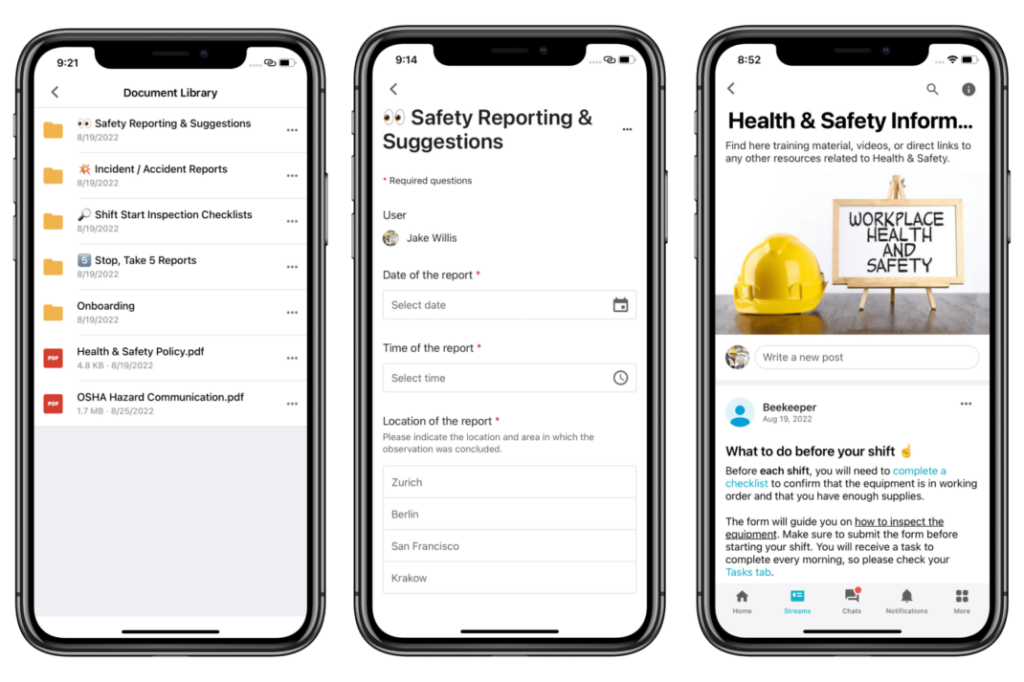The Ultimate Guide to the Whistleblower Protection Act

Table of contents
- Overview of the Whistleblower Protection Act
- Rights and Protections Under the Whistleblower Protection Act
- Procedures and Enforcement of the Whistleblower Protection Act
- Impact of the Whistleblower Protection Act on Organizations
- Challenges and Criticisms of the Whistleblower Protection Act
- Engage and Empower Your Team with Beekeeper
For as long as there have been governments and businesses, there have been whistleblowers—individuals who have brought to light fraudulent, unethical, and illegal activities of a government entity, business, or organization that they work for. (Benjamin Franklin was one of the earliest whistleblowers!)
There was a time when that was a risky thing to do, making the person vulnerable to retaliation. But the Whistleblower Protection Act was created to ensure that those who expose illegal behavior are afforded legal protections.
For workers, coming forward with information can be difficult. In this article we’ll cover……and how a dedicated mobile app can be the most secure way to create two-way communication that encourages and empowers employees to share information regarding activity that can be damaging to a company or institution, its stakeholders, and shareholders.
Overview of the Whistleblower Protection Act
The Whistleblower Protection Act of 1989 was created to protect federal employees from acts of retaliation for coming forward to reveal evidence of fraud, abuse, or mismanagement and illegal activities within their organization. Accusations of wrongdoing are investigated by the Office of Special Counsel.
The Whistleblower Protection Act reads:
“Authorizes the Board to grant protective orders to protect a witness or other individual from harassment either during a proceeding before the Board or during a Special Counsel investigation. Requires the Board, when it considers alternative places for conducting hearings or proceedings, to select the place closest to the location of the individual involved, unless the total administrative costs to the Government in conducting such hearings or proceedings would be less elsewhere.”
Key Provisions of the Whistleblower Protection Act
The Whistleblower Protection Act lays the groundwork to encourage people to come forward when they witness wrongdoing in the government.
It establishes:
- Who is protected
- The protected disclosures under the law
- How to report evidence to the Office of the Special Counsel
- How to report retaliation against a whistleblower
History of the Whistleblower Protection Act
There have been a few major milestones in developing the federal Whistleblower Protection Act.
- In 1778, during the Revolutionary War, a group of Navy sailors reported their captain who tortured British prisoners, bringing to light the act of being a whistleblower and leading to the country’s first whistleblower protection act.
- In 1978, whistleblower protection laws were recognized when the Civil Service Reform Act created the Office of the Special Counsel to investigate any claims made by federal employees.
- In 1989, Congress passed the Whistleblower Protection Act to criminalize retaliating against anyone who exposes illegal activity or wrongdoing at the federal level and created a procedure for federal employees to report activity to the Office of the Special Counsel.
- In 2012, the U.S. government passed the Whistleblower Protection Enhancement Act to include a bigger list of disclosures that are covered under the law and strengthen protections for whistleblowers.
Today, there are more than 40 federal whistleblower laws that extend coverage to people.
Rights and Protections Under the Whistleblower Protection Act
Coming forward to report something that seems unethical or illegal can be difficult. People, especially in hourly or frontline positions, might choose to look the other way for fear of retaliation by their colleagues, manager, or employer. They fear losing their jobs and ability to earn a living. The Whistleblower Protection Act is designed to encourage those people to come forward and ensure their rights are upheld and no punitive actions are taken against them.
Understanding Protected Disclosures
So, can people reveal almost anything and expect protection under the law? Per the Office of the Special Counsel, protected disclosures include:
- A violation of any law, rule or regulation
- Gross mismanagement
- A gross waste of funds
- An abuse of authority
- A substantial and specific danger to public health or safety
- Censorship related to scientific research if censorship meets one of the above-listed categories
Rights of Whistleblowers
The basic rights afforded people under the federal Whistleblower Protection Act and other whistleblower laws include:
- The right for an employee, former employee, contractor, or subcontractor (and in some cases interns) to come forward to report wrongdoing by a federal organization or a member of an organization or entity
- The right to be protected from discrimination and retaliation, such as demotion or job termination, for reporting a protected disclosure
- Additional protections with laws like the National Labor Relations Act, which protect workers when they join forces to improve workplace safety or approach their employer with complaints about the work environment
- In many instances, a whistleblower has a right to confidentiality
Whistleblowers are now often seen by the public as doing something good for society, a part of a system of checks and balances to make sure those with power are abiding by ethical and legal standards.

Source: U.S. Office of Special Counsel
Limitations and Exclusions of the Act
The Whistleblower Protection Act has grown in scope over the years, but it does not offer a blanket of protection for everyone. The law only protects federal employees when they reveal information specifically defined in the protected disclosures.
There are federal departments not covered by the law, including the Government Accountability Office, U.S. Postal Service, Postal Rate Commission, Federal Bureau of Investigation, and the Central Intelligence Agency. But some agencies, like the USPS, have voluntarily decided to adopt the WPA and intelligence employees are covered specifically by the Intelligence Community Whistleblower Protection Act of 1998.
The Whistleblower Protection Act is specifically written to protect federal employees, former federal employees, and applicants of federal positions. But it does not extend to state and local employees or those in the private sector. Instead, there is a patchwork of federal laws (from the U.S. Department of Labor and OSHA) as well as state and local laws that cover people outside of federal employment.
Procedures and Enforcement of the Whistleblower Protection Act
Being a whistleblower starts with having some insider information. But what do they do with it and where do they go? There are a few ways someone can pass along what they know to start an investigation.
Reporting Procedures for Whistleblowers
Different laws have different avenues for reporting disclosures. For example, employees in the private sector may follow OSHA procedures with an online whistleblower complaint form.
Federal employees have a few ways to make a report:
- Inform a higher-up or leader in their organization
- Submit a complaint to the Office of the Inspector General via email at oig@ftc.gov
- File a complaint with the Office of Special Counsel. This is the most direct route since the OSC has the full right to investigate allegations. Once reported, an investigator is assigned to the case and contacts the whistleblower. There is an interview and the investigator will ask for any documentation that can help substantiate claims, ask for witness contact information, and conduct a full legal review and investigation.
Role of the Office of Special Counsel
The Office of Special Counsel was formed in 1978’s Civil Service Reform Act as an independent investigative office dedicated to protecting employees from retaliation for uncovering illegal activities in their federal workplace. It establishes a secure channel for workers to report suspected misconduct.
The OSC conducts investigations, protects employees, and writes a report of their findings. That report gets sent to the United States President and relevant congressional committees. That information is also made public (thanks to the Freedom of Information Act) on OSC’s website.
Legal Recourse and Remedies for Whistleblowers
Whistleblowers can often experience retaliation in the workplace for making others aware of possibly fraudulent or illegal activity. They can face workplace harassment, demotions, and even termination. All of those actions are illegal and workers are entitled to protections under the Whistleblower Protection Act. If retaliation does occur, employees secure an attorney and can sue the agency or employer for damages. Some whistleblowers receive monetary awards if it leads to fraudulent activity that recovers money for the government.
Impact of the Whistleblower Protection Act on Organizations
Whistleblower protection laws have changed how many organizations operate. Transparency is a critical value now and employee input and feedback is encouraged so leaders can stay ahead of any issues before they snowball into a crisis, and before internal issues become front page news. In fact, the Harvard Business Review once published an article titled “Whistleblowers are a sign of Healthy Companies.” Why? Because companies that face their problems head on and address them early lose less money to lawsuits and can save their brand’s reputation.
Compliance Requirements for Employers
Almost every organization, business, and workplace must be aware of and follow whistleblower protection acts. That often falls under the human resources department to be aware of and stay compliant with each whistleblower law. For companies that don’t fall under the primary federal law, they must adhere to other protection acts in either their state (New York and California have strong whistleblower laws) or other federal agencies like OSHA.
For example, the Sarbanes-Oxley Act was established in 2002 after the Enron case and protects whistleblowers (and investors) in cases involving fraudulent financial accounting and reporting of public companies. It requires public companies to establish a business code of ethics and have a documented procedure for employees to report any fraudulent or ethical violations.
Creating a Whistleblower-Friendly Workplace Culture
First of all, companies should make every effort to have no fraudulent, unethical, or illegal activity in its ranks. But that’s not always possible. A rogue employee might be mismanaging funds or diverting earnings from investors. Companies need to create and support a workplace that encourages people to come forward with any knowledge of bad behavior. (Rewards are always a good way to encourage this.) Hearing information first, before the media or investors, can help companies get ahead of the problem, determine validity, address the situation, and craft messaging that will mitigate the public response.
Companies can build a whistleblower-friendly workplace in a few ways:
- Have a compliance officer and department to ensure the company follows all relevant laws and mandates
- Create a whistleblower policy and procedure and share that with all employees so they understand they will be heard and will not be punished if they come forward with information
- Have a third-party look into any whistleblower claims to ensure there is no bias in any investigation
- Have a whistleblower “hotline” so workers can report knowledge (with the option to remain anonymous.) In today’s workplace, this might happen on a secure communication channel via a mobile productivity tool.
Pro tip: A solution like Beekeeper has thehighest rated security levels to ensure all whistleblower message transmissions are protected.

Source: Beekeeper
Case Studies: The Act in Action
If you’ve ever seen the famous Julia Roberts movie Erin Brokovich, then you’re familiar with the act of whistleblowing. The film tells the true story of a paralegal, Erin Brokovich, who went up against PG&E (Pacific Gas & Electric) for contaminated groundwater that caused high cancer rates in Hinkley, California (and won!)
Other famous cases include:
Theranos
In the private sector, who can forget the recent case of Theranos? When Elizabeth Holmes wanted to secure federal approval and billions in private funding from what seemed like a revolutionary blood-testing machine, she falsified results when the machines weren’t working. Employees were concerned with what they witnessed and told investors, only to be fired and escorted off the premises, followed by private investigators, and threatened. Eventually they were proven to be right and Holmes and her partner, Ramesh Balwani, were sentenced to prison. The case also revealed gaps in whistleblower protection laws, especially when it comes to consumer fraud and safety.
U.S. Army Corps of Engineers and Halliburton
In 2001, a chief contracting officer for the Army Corps of Engineers, Bunny Greenhouse, noticed the award of a five year contract to Halliburton. The problem? All contracts had to be put out for bid and Halliburton was simply given this “no bid, no competition” contract worth $1 billion. Greenhouse went to Congress and revealed one of the biggest acts of corruption in government contracting history. She was subsequently demoted, but at that point the fraudulent activity had gone public and Greenhouse, though praised for her bravery, insisted she was just doing her job. Bunny was awarded a settlement in 2011 and a year later further Whistleblower Protection Enhancement Act was passed.
Challenges and Criticisms of the Whistleblower Protection Act
While the primary Whistleblower Protection Act lays a solid foundation for people to come forward, there are some challenges to how the law is applied.
Notable Challenges and Limitations
The 1989 Whistleblower Protection Act is limited in its scope. It covers just current and former federal employees and contractors and has a specific list of protected disclosures. But whistleblowing is an important part of keeping businesses and agencies in check and accountable to the public, their investors, and their workforce. Without one law that covers everyone, workers might be unaware if they are protected from retaliation and hesitant to come forward with information afraid they’ll be hung out to dry, lose their job, and be sued for their revelations.
Recent Criticisms and Proposed Reforms
Taking these limitations into account, whistleblower laws are continually reviewed and lawmakers attempt to strengthen protections. For example, the SEC Whistleblower Reform Act of 2023 expands protections to those reporting on SEC violations under the federal law to their supervisors and employers.
There are a number of whistleblower reform bills going in front of Congress this coming year that cover:
- Bigger rewards for whistleblowers
- Greater coverage of whistleblowers in federal agencies
- Strengthening protection for Medicare fraud whistleblowers
86% of Americans want to see stronger whistleblower protection laws, a signal that public perception has shifted over the past decades to view them as heroes.
Comparing International Whistleblower Laws
The United States has, by far, the strongest whistleblower protection laws, as does the United Kingdom. Some countries have very few legal protections while others have none. (Surprisingly, Canada has a poor reputation for their weak whistleblower protection laws.)
But the Organisation for Economic Cooperation and Development (OECD), a global group that creates international policies, is pushing for a global culture of anti-corruption and support for whistleblower protections. Bit by bit, governments around the world are realizing that whistleblowers can help fight corruption, maintain integrity, and protect companies (and countries) from fraud and are taking action to encourage people to speak up. Here is a great map that shows whistleblower laws around the world.
With the Whistleblower Protection Act, people were supported in speaking out against fraud and corruption. In 2022 alone, the SEC received over 12,000 whistleblower tips. In fact, across the board—from federal agencies to private companies, whistleblowing is on the rise. It’s a sign that communication is valued, “speak-up culture” is gaining traction, workers are supported, and doing the right thing is recognized and rewarded.
Engage and Empower Your Team with Beekeeper
With all of this information about the Whistleblower Protection Act, you might be thinking, “How can I be proactive and encourage my team to bring information to the attention of company leadership before we even get into a whistleblowing scenario?” Great question!
With Beekeeper, you’re shaping a culture of transparency and empowering your team to contribute to the conversation. Beekeeper is a workforce solution designed as a mobile-first platform. That means it will include every worker from wherever they are in real time. And while it is a tool that centralizes information, digitizes workflows, and consolidates all of your workplace tools, Beekeeper is also a two-way communication portal that enables workers to send messages, comment on posts, and contribute to streams.
Whistleblowers are often afraid to come forward. But when you give your workforce a secure tool to deliver confidential information and encourage them to use it, you’re creating a system of checks and balances to ensure a safe, equitable, and compliant workplace for all. You’re also asking them to be your eyes and ears, to “say something if they see something.” That engages a team like never before because you are making them active contributors to your company’s success.

Source: Beekeeper
Beekeeper even has templates you can customize, like safety reporting forms, so employees can submit information about a workplace hazard or dangerous behaviors. The more you engage your team on Beekeeper, the more willing they will be to come to you with concerns before they become bigger issues. With a tool like Beekeeper, and an empowered workforce, you’ll build a workplace built on trust and transparency, and a workforce that looks out for one another.
Learn how to guide and engage your employees through the entire lifecycle with Beekeeper.

About the author
Beekeeper
We make frontline lives easier, work safer, and teams more connected so businesses can reach new heights. At Beekeeper, we’re dedicated to making frontline lives easier by connecting workers with the tools, support, and information they need to feel valued, do their best work, and drive the business forward.







